|
|
|
Sort Order |
|
|
|
Items / Page
|
|
|
|
|
|
|
| Srl | Item |
| 1 |
ID:
158103
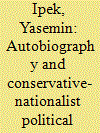

|
|
|
|
|
| Summary/Abstract |
This article examines how autobiography-writing evolved into a political space for Kazım Karabekir, Ali Fuat Cebesoy and Rauf Orbay, three major leaders of the Turkish War of Independence and the Progressive Republican Party. This article demonstrates that their autobiographies articulate a position of political opposition. This is a novel addition to academic literature that has so far presented these figures as early representatives of peripheral dissent against the Republic, or overstressed their Unionist legacy. The autobiographical politics of Karabekir, Cebesoy and Orbay extensively builds on moralizing discourses that contrast their own heroic accomplishments against the rise of a circle of military-bureaucratic elites – etraf – surrounding Mustafa Kemal Atatürk. Through textual analysis, this article maintains that the moralizing discourses they use pose a peculiar blend of nationalism and conservatism – an elitist conservative nationalism that homogenizes political differences and ideological splits. The analysis contributes to the study of Early Republican oppositional politics and conservative political imaginary in Turkey.
|
|
|
|
|
|
|
|
|
|
|
|
|
|
|
|
| 2 |
ID:
164903
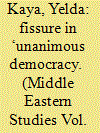

|
|
|
|
|
| Summary/Abstract |
The parliamentary politics of Turkey's one-party regime (1925–1946) has been described as a ‘unanimous democracy’, particularly on account of the absence of a voting opposition. Many scholars consider the Law for Providing Land to Farmers of 1945 as the first instance of parliamentary opposition in the one-party legislature. The current article challenges this widespread view and argues that property rights on land tended to provoke backlashes even before 1945. It examines the making of the deportation, land distribution and settlement laws of the 1920s and 1930s, all of which sanctioned intervention into property relations on land in the form of the expropriation of landowners. Going beyond an exclusive focus on voting patterns, this article traces parliamentary resistance by examining how government bills changed as they proceeded through both the reviewing committees and the general assembly. It links the birth of a full-fledged parliamentary opposition in 1945 to the previous waves of discontent and shows that property rights on land was a constant fissure in the early Republic's unanimous democracy.
|
|
|
|
|
|
|
|
|
|
|
|
|
|
|
|
| 3 |
ID:
174164
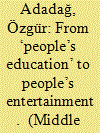

|
|
|
|
|
| Summary/Abstract |
This article analyzes the use of cinema by the People’s Republican Party in the early decades of republican Turkey. It focuses on cinema activities in the People’s Houses, which from 1932 onward opened in different regions of the country and operated as the party’s cultural organ. Relying on a range of archival materials, it shows that from the mid-1930s, cinema came increasingly to be used by the party as a propaganda device for promoting ‘people’s education’; from the mid-1940s, however, the party began to turn to cinema as a source of revenue to keep the People’s Houses financially afloat. While this change owed much to the political and economic conditions of the period following the Second World War, it was equally a product of the different expectations locals had of the cinema, as distinct from those of the People’s House administrators and the party leaders in Ankara. Where the latter group viewed cinema as a tool for ‘people’s education’, People’s House administrators saw it as a source of income, and the locals who visited the People’s Houses saw it as a means of entertainment.
|
|
|
|
|
|
|
|
|
|
|
|
|
|
|
|
| 4 |
ID:
181295
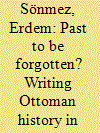

|
|
|
|
|
| Summary/Abstract |
Scholars of modern Turkish history have long asserted that Ottoman history and historiography were effectively silenced by the Kemalist elite in the early republican period. According to the existing scholarship, the Kemalist nation-builders regarded the new republic as the exact opposite of the ‘cosmopolitan’ Ottoman Empire, discrediting it as an illegitimate ancien régime. As a result of this break with the Ottoman past, which entailed the destruction or silencing of everything recalling it, the study of Ottoman history was discouraged and Ottoman historians were pushed to the margins of academic and intellectual life by the single-party regime. This article problematizes this widely accepted and oft-repeated argument that not only derives from but also reproduces the stereotyped perspectives on modern Turkish history. Focusing on the historical literature produced in the 1920s and 1930s, exploring the relationship between the single-party regime and Ottoman historians, and examining the temper and content of contemporary works on Ottoman history, this article aims to present a more nuanced picture of early republican Turkish history and historical writing, and argues that Ottoman historiography, which had already received a nationalized vocabulary and agenda before the republican era, continued to flourish in its own realm throughout all this period.
|
|
|
|
|
|
|
|
|
|
|
|
|
|
|
|
| 5 |
ID:
164901
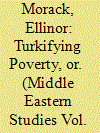

|
|
|
|
|
| Summary/Abstract |
This article shows that ‘Turkification’, a term widely used by historians of modern Turkey to refer to the forced transfer of property from Christian into Muslim hands, ought to be conceptualized not only in the sense of ‘enrichment’ but also, with regard to the working classes, as a process in which Muslim people inherited the poverty of their Christian predecessors. Taking İzmir as a case in point, the article first describes the plight of the overwhelmingly Christian working class prior to 1922. It then studies reports and editorials that discussed the economic and social situation in İzmir in the years 1923 to 1926, after the Turkish victory and forced migration of her Christian population. Over the course of these years, İzmir experienced a serious economic crisis, and bread prices reached levels that led to widespread undernourishment and hunger among the cityʼs poor. Agricultural production was lagging behind pre-war levels, and positive effects of ‘Turkificationʼ policies were failing to materialize. By analyzing the contemporary journalistsʼ attempts at explaining the crisis, but also pointing out national and transnational factors that they were probably unaware of, the article makes an original contribution to the economic and social history of early republican Turkey.
|
|
|
|
|
|
|
|
|
|
|
|
|
|
|
|
|
|
|
|
|